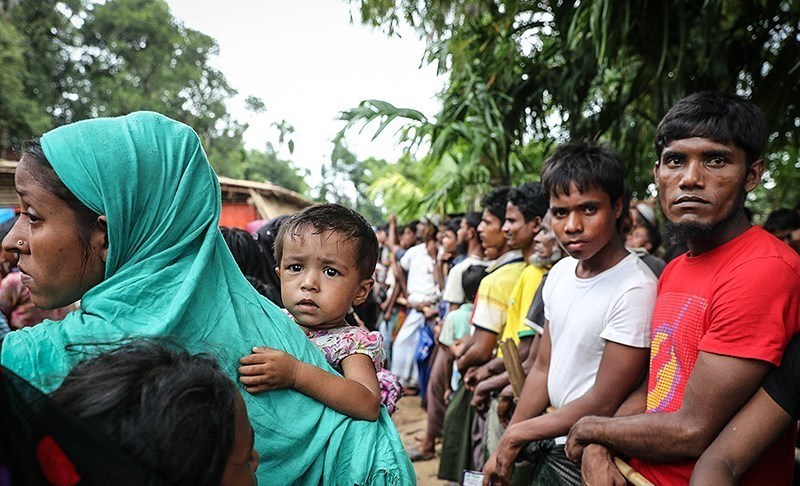Special to WorldTribune.com
UNITED NATIONS — In a stunningly gloomy presentation, UN human rights experts reviewed the situation in Myanmar/aka Burma, the Southeast Asian country where the government continues to persecute, harass and eliminate members of minority religious groups, especially the Muslim Rohingya.
An already bad human rights situation deteriorated two years ago, when the Myanmar military embarked on a ruthless ethnic cleansing campaign which uprooted more than a million people since 2017.

Marzuki Darusman, Chair of the Independent International Fact-Finding Mission on Myanmar, warned that the “cycle of impunity enables and fuels this reprehensible conduct by security forces. The blatant persecution of the Rohingya continues unabated.”
The situation facing 600,000 Rohingya remaining in Rakhine State is largely unchanged. Addressing the UN’s Third Committee Dr. Darusman added, “We conclude that there is a strong inference of continued genocidal intent on the part of the State in relation to the Rohingya, and there is a serious risk of genocide recurring.”
Dr. Darusman, an Indonesian lawyer and human rights advocate, added “The human rights catastrophe in Myanmar has not ended. The Government of Myanmar is defiant and at best unconcerned. This is not the time for complacency, and the situation remains urgent.” He addressed the need for the international community to bring about accountability and justice.
Furthermore Ms. Yanghee Lee, Special Rapporteur on the situation of human rights in Myanmar, conceded that the regime continues to deny her access, but human-rights issues, abuses and violations are still reported to her. “There is no discernible improvement to the situation in Myanmar,” she added. The Government has neither repealed nor amended repressive laws that infringe on rights, and “these continue to be weaponized against those attempting to exercise their rights to free expression, association and assembly.”
Prof. Lee, a South Korean rights advocate, expressed concern over discrimination against religious minorities, she pointed to 27 villages that describe themselves as “Muslim-free,” banning Muslims from entry. She added that fierce fighting between the Burmese military and the Arakan Army ethnic insurgency continues; “People have been targeted, killed and injured by indiscriminate fire, and entire villages have been burned.”
She later told correspondents that the overall situation in Myanmar has seen “no discernible improvement” and that as many as 60,000 people have been displaced by the conflict in Rakhine this year alone.
Myanmar UN diplomats naturally rebuffed the findings.
Indeed, Burma’s Beijing backed military regime ruled for nearly a half century until pro-democracy demands broke its exclusive grip on power in 2011. The rise of Aung San Suu Kyi in 2015 and her National League for Democracy government was viewed by most a long awaited development in the country’s tortuous move towards a more open and possibly democratic system. This was but an illusion for this land of 53 million people dominated by the Burmese majority in control of an amazing 135 ethnic groups!
Though Suu Kyi cast herself as the angel of democracy, her power was largely proscribed by Myanmar’s military, the notorious Tatmadaw who controls both security and business in Burma.
Burma, a resource-rich former British colony nonetheless holds a strategic position bordering China and shadowing India on the Bay of Bengal. Given its strategic location, Beijing is building the Kyaukphyu deep seaport and economic zone as part of its Belt and Road Initiative trade corridor.
Control of jade exports to China are part and parcel of the government’s commercial grip.
A number of Chinese state-owned companies remain active inside the country. Furthermore, its close political ties to Beijing have allowed Burma to avoid diplomatic pressures from the UN Security Council.
When asked about the mercurial role of the once-lauded Aung San Suu Kyi, Prof. Lee conceded “well she’s another politician.”
As Dr. Darusman told the Committee, “the involvement of the Tatmadaw in business correlates with their ability to commit atrocities. The Tatmadaw operate without the constraints of the national budget and have been able to commit atrocities with complete liberty.”
When this correspondent asked about the Rohingya driven out of Myanmar, he stated, “one million people fled” and are mostly in neighboring Bangladesh camps.
Though the Myanmar government has said it will allow the Rohingya to return, both Human rights lawyers stated categorically “it’s not safe.” Earlier Darusman stressed, “The return of nearly 1 million Rohingya refugees to Rakhine State is ‘simply impossible’ under current circumstances. Nowhere is there a safe and viable place to which they can return.”
So will Myanmar’s rulers get away with ethnic cleansing? Very likely so given China’s protection.
John J. Metzler is a United Nations correspondent covering diplomatic and defense issues. He is the author of Divided Dynamism the Diplomacy of Separated Nations: Germany, Korea, China (2014). [See pre-2011 Archives]

 By
By